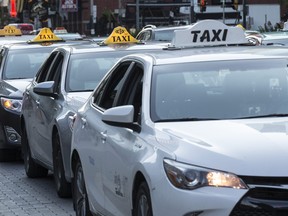The timeline for electrifying the city-owned vehicle fleet is far more liberal

Article content
Toronto’s plan to require taxicabs and rideshare vehicles to be fully electric by 2031 is getting a resounding thumbs-down from the industry.
Advertisement 2
Article content
Approved by council nearly a year ago, the rule requiring vehicles-for-hire to be electric specifically targets some of Toronto’s most vulnerable workers, says Earla Phillips, vice-president of the Rideshare Drivers’ Association of Ontario.
“The vast majority of drivers are newcomers, people of colour, women, older people — these are all marginalized people who cannot afford these EV transitions,” she told the Toronto Sun.
“The vast majority of drivers don’t live in homes where they can install chargers, they live in apartment buildings.”
That’s a sentiment shared by Beck Taxi operations manager Kristine Hubbard, who said most of their cabbies are owner-operators, and thanks to the city’s unwillingness to regulate numbers are now forced to compete against skyrocketing numbers of drivers for an ever-decreasing amount of fares.
Article content
Advertisement 3
Article content
“This city created the largest, most vulnerable workforce in our history … and now is going to depend on all these poorer drivers that they’ve created — with 100,000 more vehicles on the road — to be the ones to set the example,” she said.
During last year’s deliberations over the plan, city staff described the 2030 EV mandate as both aggressive and aspirational, and expressed concern that the industry may not be ready for such a swift change.
Recommended from Editorial
-

Uber riders to be told to buckle up
-

Taxi scam picking up PINs, not customers, Toronto cops warn
“This is a political statement, this has nothing to do with the environment,” Hubbard said.
Phillips said it’s unfair the city is targeting them, when their timeline for electrifying the city-owned vehicle fleet is far more liberal.
Advertisement 4
Article content
“The city’s own target to switch their own vehicles is 2040, but here they are forcing a mandate upon the vehicle-for-hire industry, which have had its income severely depressed,” she said.
“They’re forcing it on us 10 years sooner than their own mandate for EVs.”
Another issue seemingly ignored by the city is that, as of 2024, no insurance companies are yet willing to insure EV taxis, Hubbard said.
As well, city regulations require taxis to be no older than seven years old.
“About 1,000 are to be replaced this spring. They’re not going to be EVs because we still don’t have insurance and there still won’t be enough chargers,” Hubbard said.
“Are we suggesting that by 2030 all of those vehicles should be thrown in the garbage? How is that good environmental policy?”
Article content








